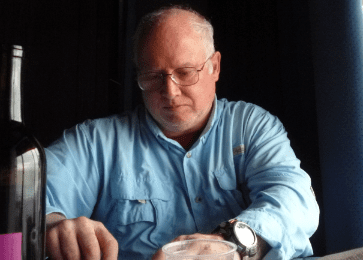REVISION
You can smell the sunlight as it stalks us through the weeds
in the abandoned lot. It’s like the old dog that circles
before he finds his spot. A few stars defy the town’s pink
glow. A few late sounds stagger out from the corner bar.
I can’t sleep. There’s a falcon on the ledge ready to revise
what happens below. The sound of a hidden bird imitates
the backup chirp of the delivery truck approaching
the loading dock.
I should have begun with that warning sound,
I should have begun when the sun crossed the town of Houla,
Syria, brushing the bodies of the massacred children. They look
like carefully wrapped cocoons.
Here, time slips down
the side of a building as if it were only a shadow.
Spider webs glisten beneath a fire escape. Someone has
tossed a few broken needles in the gutter.
So, then,
where do you go from there? I can hear but not see
the churning of a river barge. Even the clouds are in a rush
to leave. Everyone’s watch keeping a different time.
In a little while the news will come courtesy of a man’s
deodorant. Another gang of illusions will express its sincere
disapproval.
Why do we so often begin with ourselves,
with our emotions and their price tags still attached?
Here, there’s a single light in a window across the street
that shines down on a pigeon caught in a pool of green-
blue oil. The town clock refuses to strike. There’s a busted
shopping cart against the curb. The diseased trees cut down
along the avenue are stacked like kindling.
There was a time
when we knew, or seemed to know, how to surrender our
shadows to the shadow of the truth. Our memories are like
children’s pick up sticks we forget how to grasp.
But in fact,
there never was a real beginning. The star whose light
approaches is not where it began. You can’t trace the origin
of the bullets that explore the insides of those children.
Out of the ruins of our words other ruins rise. They are not
going to circle back to be revised.
Someone says the dolphins
and pelicans dying off the coast of Peru is a sign of the end.
There ought to be a better ending than that, better than
a few words walking off into the fog, better, certainly, than
those boys throwing sticks at a trapped pigeon, but there isn’t.
____________________________________________________________________
TIP OF MY TONGUE
I forget what I was going to say but it was right there on
the tip of my tongue,
but if I keep on here it’s sure to come
back to me like one of those women we thought had been
sawed in half during those old vaudeville acts.
But the thing is,
not all that we remember is helpful, as when the Herald
in Agamamenon starts to remind the crowd about all their
dead who won’t return from Troy and so they begin to turn
on him, until he stops mid fragment and changes direction.
On the other hand, if you remember too many details
and you might end up like Plato’s chattering crickets whose
meaning is only background,
or your own prattle might mean
too much like one of the disappeared who were abducted,
wined or dined into a stadium in Santiago where, as the joke
went, the wine turned back into blood.
The thing is to sift out
the important sounds, little syllables and vowels that bring
hints of their lost words, and not to mistake the fossil for
the life, or the kiss for the love, not to mistake the fragment
for the sentence.
The thing is, we scrape our dreams on a word
we never saw, or wander around in the empty rooms
of our souls looking for words to define ourselves just as
God wandered around Eden out of loneliness, or as Jimmy
Piersal tried to hide behind the flag pole at Fenway Park
unable to say where he was.
The thing is we get there eventually
once we stop thinking about what we are thinking about, unless
someone takes the words out of our mouths,
though in this case
I am remembering now the word for what was described, how the suicide
vest seemed to inhale for a moment before exhaling into fragments
of sky, like the several suns coming into being at any moment
in the universe, remembered in the impossibly beautiful, impossibly
horrifying sentences no one could say, no one could remember.
____________________________________________________________________
Read more of Richard Jackson’s work in B O D Y:
“PHOTO POEMS” – a photo essay in verse
NOW THAT YOUR EYES ARE SHUT: THREE NEGLECTED AMERICAN WOMEN POETS FROM THE EARLY TWENTIETH CENTURY
____________________________________________________________________
RICHARD JACKSON is the author of ten books of poems including Resonance (2010) (Eric Hocher Award), Half Lives: Petrarchan Poems (2004) and Unauthorized Autobiography: New and Selected Poems (2003). He has also published two books of translations, Last Voyage: The Poems of Giovanni Pascoli from Italian (2010) and Alexandar Persolja’s Journey of the Sun from Slovene (2008). He is also the author of two critical books, Acts of Mind: Conversations with American Poets (Choice Award) and Dismantling Time in Contemporary Poetry (Agee Award Winner), and has edited two anthologies of Slovene poetry, as well as the journal Poetry Miscellany. His work has been translated into fifteen languages and has appeared in The Best American Poetry, among other collections. He has been awarded the Order of Freedom Medal by the President of Slovenia for literary and humanitarian work in the Balkans, and has been named a Guggenheim Fellow, Fulbright Fellow, Witter-Bynner Fellow, NEA fellow, NEH Fellow, and has lectured and given readings at dozens of universities and conferences here and abroad. In 2009 he won the AWP George Garret National Award for Teaching and Arts Advocacy.
